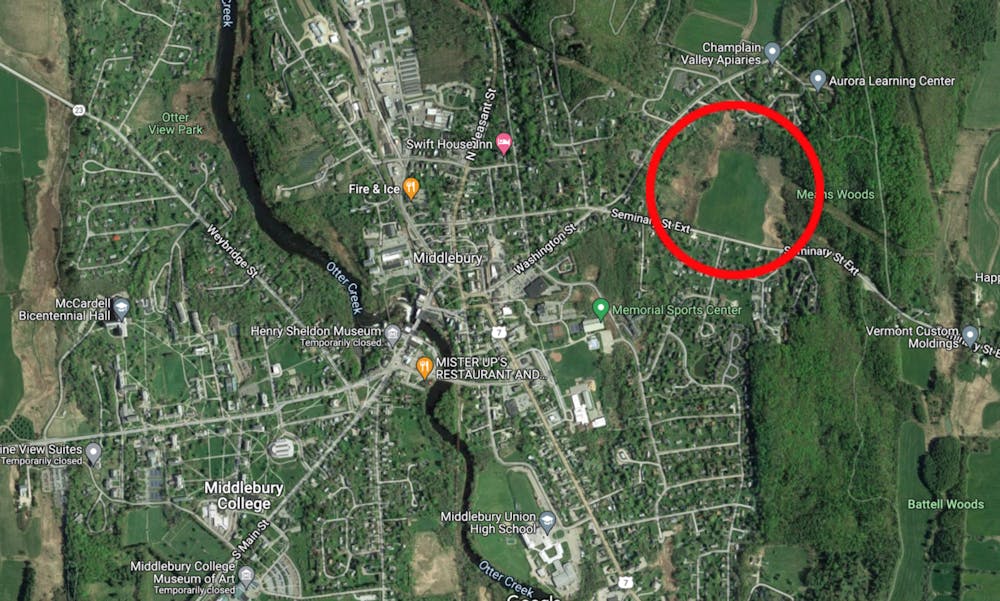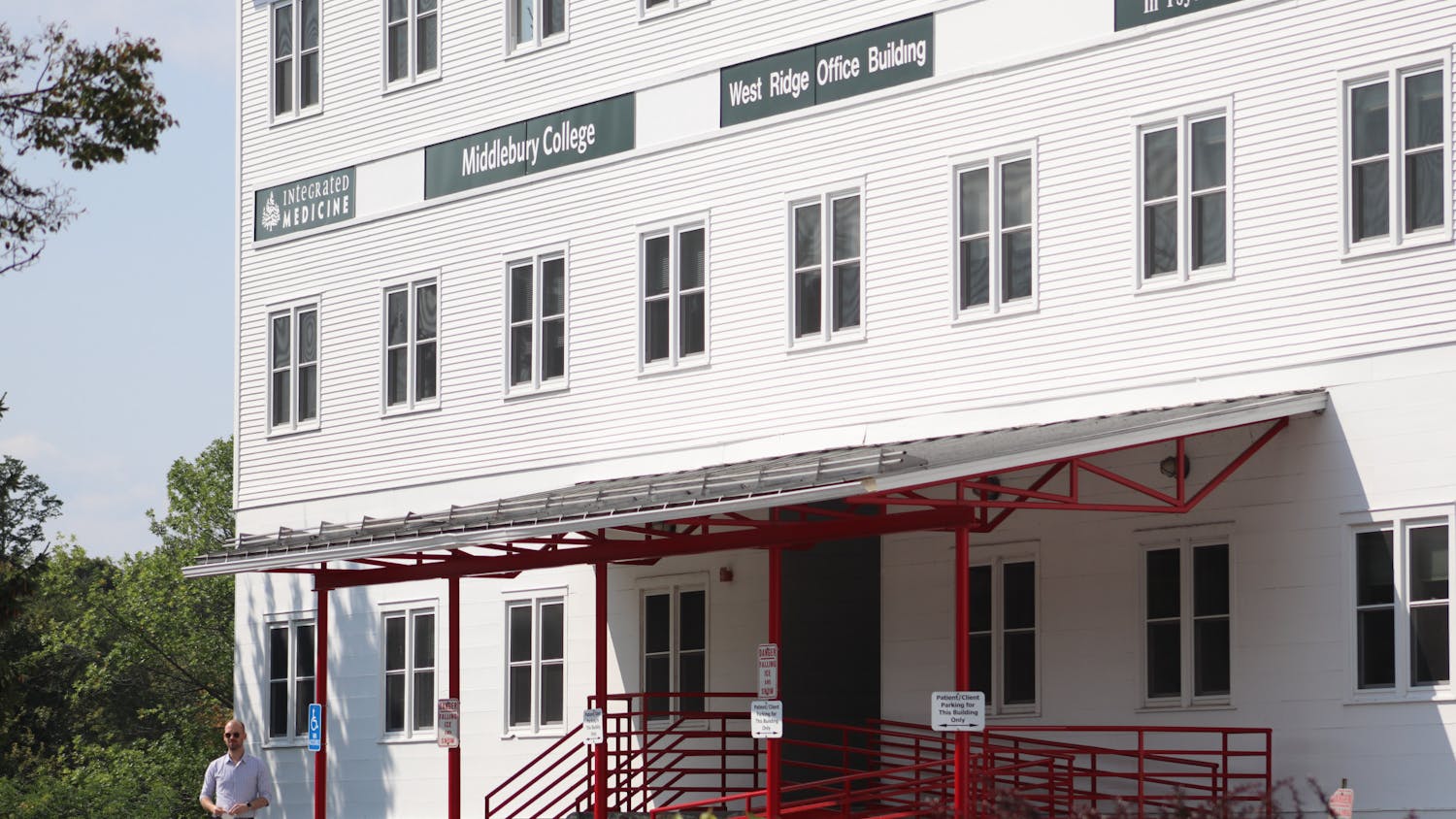On Friday, April 8, Middlebury announced its purchase of a 35-acre parcel of land on Seminary Street Extension in downtown Middlebury for $1.5 million, a deal the Board of Trustees approved in February. The college plans to have Summit Properties of South Burlington, a development company owned by Middlebury graduates Charlie Brush ’69 and John Giebink ’77, create mainly affordable and subsidized workforce housing on the lot.
Executive Vice President of Finance and Administration David Provost cited the college’s role in supporting the town’s economy and the need to address hiring challenges as the main reasons behind the purchase. The lack of reasonably priced housing options in Addison County has been an obstacle to hiring for the college, Porter Medical Center and other local employers. The influx of new Vermont residents during the pandemic as people left urban areas only worsened the issue.
“We know [that] to attract and retain the best faculty and staff, they need to be able to access housing. That is becoming a problem across Vermont,” Provost said. Currently, about 20% of the college’s workforce commutes from New York, according to Provost.
Mira Veikley, assistant professor of theater, attested to the obstacles housing scarcities create for college employees. When she began working at Middlebury in 2015, she rented in Ripton and did not move to the town of Middlebury until 2018. Though she has had a positive experience with her rental in Middlebury, she noted that her single-income friends, in particular, have had more difficulty finding affordable places.
Veikley also said the lack of childcare options in Addison County can put young working parents in a difficult position when there are no housing options for extended family members to move nearby.
“Considering the whole circle of people who you want to build a foundation with as a faculty member, it would mean a lot if there was more housing. My mom could consider selling her house if she was able to get something here that would sustain her long term,” she said.
The property the college purchased is zoned for high-density housing, and the development plans currently provide for the creation of approximately 100 units ranging from one to four bedrooms that will house 250 to 350 people in total. The mix of housing types will be determined at a later time, but apartments, multi-family houses and single-family homes are all in consideration.
The costs of and income requirements for affordable housing is determined by local law. In Addison County, households of two with a combined income under $50,000 qualify for affordable housing, while households of two with a combined income between $50,000 and $80,000 qualify for subsidized workforce housing. There will be some housing units available at market price for those with combined incomes over $80,000.
There will not be explicit restrictions on who can purchase the housing units such that they would be reserved for college employees, though Human Resources plans to advertise and make units accessible as they become available by organizing open houses for faculty and staff, according to Provost.
“If the development ends up housing around 300 people, we are confident that a big proportion will be taken by college and hospital employees,” he said.
The college had considered using land it had acquired over the past 30 to 50 years to develop affordable housing, but the costs of setting up utilities would have been too high, according to Provost. The parcel on Seminary Street Extension was a better option because it is walking distance to the college and it already has utilities infrastructure in place.
When Summit Properties approached the college about partnering to purchase and develop the land, the deal made sense. The development company had previously tried unsuccessfully to buy the property, and partnering with the college helped the project receive approval from the community.
“We are happy to work with Summit because they know Addison County, and the college doesn’t want to get into the development business and own homes,” Provost said.
As Summit develops the property and begins to rent and sell homes, the company will gradually pay back the college the $1.5 million initial cost. The college will not be responsible for any of the estimated $40 million needed for the development.
In addition to the lot, there is a nine-bedroom house on the edge of the newly acquired property in need of renovation. College administrators plan to sell it and are working with potential buyers to explore various uses for the house.
Construction is set to begin within the next eight months and continue over the next five to six years, although Provost is hopeful the project will be complete sooner. “From a developer’s standpoint, that is a reasonable timeframe given the volatility of the construction market. But I am hopeful to do it sooner than five to six years, because we need it sooner,” he said.
Provost also mentioned that although the college has never previously purchased a large parcel of land in town, it has invested in infrastructure projects like the crosstown bridge to Route 7 and the Middlebury Town Hall.
“The purchase is reflective of our desire to be in and of the community and a steward of the community,” he said. Along those lines, the next contribution President Laurie Patton hopes to give to the town is the creation of a regional childcare facility.
Editor’s Note: Madeleine Kaptein ’25.5 contributed reporting.

Ideal Dowling '22 is an Editor at Large.
She previously served as a copy editor and Local section editor.
Dowling is majoring in Political Science and minoring in French and History. During the summer of 2021, she worked as a consultant for the startup accelerator Aegis Ventures and as a research assistant for Professor Stanley Sloan as he worked on his book "De-Trumping U.S. Foreign Policy: Can Biden Bring America Back?" In addition to her work at The Campus, Dowling is captain of Middlebury's women's squash team and an employee at the Middlebury College Museum of Art.




